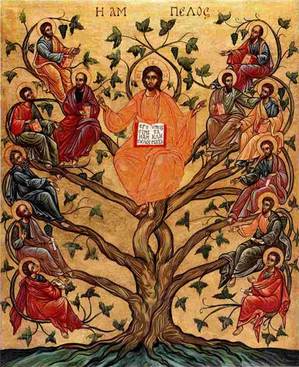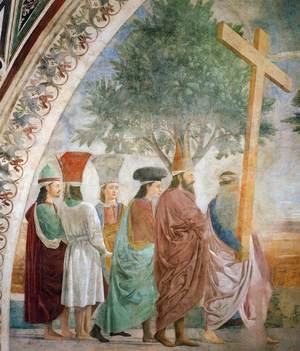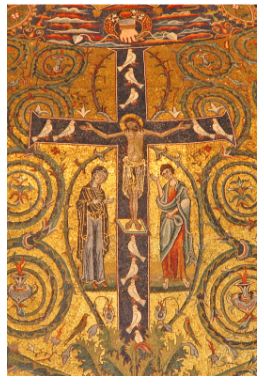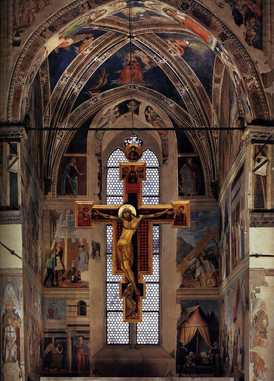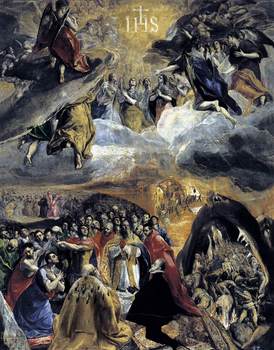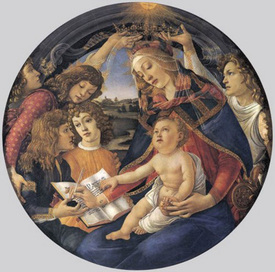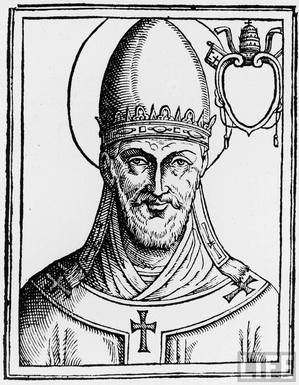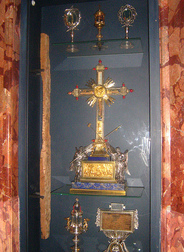Pope Benedict XVI address delivered during the general audience (10/22) in St. Peter's Square.
Dear brothers and sisters:
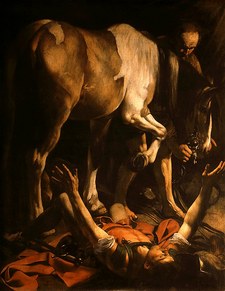 In the catecheses from previous weeks, we have meditated on the "conversion" of St. Paul, fruit of a personal encounter with the crucified and risen Christ, and we have asked ourselves about the reaction of the Apostle to the Gentiles to the earthly Jesus. Today I would like to speak of the teaching St. Paul left us about the centrality of the risen Christ in the mystery of salvation, about his Christology.
In the catecheses from previous weeks, we have meditated on the "conversion" of St. Paul, fruit of a personal encounter with the crucified and risen Christ, and we have asked ourselves about the reaction of the Apostle to the Gentiles to the earthly Jesus. Today I would like to speak of the teaching St. Paul left us about the centrality of the risen Christ in the mystery of salvation, about his Christology.
In reality, the risen Jesus Christ, "exalted above every name," is at the center of all his reflections. Christ is for the Apostle the standard to evaluate events and things, the purpose of every effort that he makes to announce the Gospel, the great passion that sustains his steps along the paths of the world. And he is a living Christ, concrete: The Christ, Paul says, "who loved me and gave himself up for me" (Galatians 2:20). This person who loves me, with whom I can speak, who listens and responds to me, this is really the principle for understanding the world and for finding the way in history.
Anyone who has read the writings of St. Paul knows well that he does not concern himself with narrating the events that made up the life of Christ, even though we can imagine that in his catecheses, he recounted much more about the pre-Easter Jesus than what he wrote in his letters, which are admonitions for concrete situations. His pastoral and theological work was so directed toward the edification of the nascent communities, that it was natural for him to concentrate everything on the announcement of Jesus Christ as "Lord," alive today and present among his own.
Here we see the essentiality that is characteristic of Pauline Christology, which develops the depths of the mystery with a constant and precise concern: To announce, with certainty, Jesus and his teaching, but to announce above all the central reality of his death and resurrection as the culmination of his earthly existence and the root of the successive development of the whole Christian faith, of the whole reality of the Church.
For the Apostle, the Resurrection is not an event in itself that is separated from the Death.
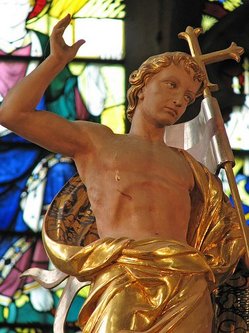 The risen One is the same One who was crucified. The risen One also had his wounds: The Passion is present in him and it can be said with Pascal that he is suffering until the end of the world, though being the risen One and living with us and for us. Paul had understood on the road to Damascus this identification of the risen One with Christ crucified: In that moment, it was revealed with clarity that the Crucified is the risen One and the risen One is the Crucified, who says to Paul, "Why do you persecute me?" (Acts 9:4). Paul was persecuting Christ in the Church and then understood that the cross is "a curse of God" (Deuteronomy 21:23), but a sacrifice for our redemption.
The risen One is the same One who was crucified. The risen One also had his wounds: The Passion is present in him and it can be said with Pascal that he is suffering until the end of the world, though being the risen One and living with us and for us. Paul had understood on the road to Damascus this identification of the risen One with Christ crucified: In that moment, it was revealed with clarity that the Crucified is the risen One and the risen One is the Crucified, who says to Paul, "Why do you persecute me?" (Acts 9:4). Paul was persecuting Christ in the Church and then understood that the cross is "a curse of God" (Deuteronomy 21:23), but a sacrifice for our redemption.
The Apostle contemplates with fascination the hidden secret of the crucified-risen One, and through the sufferings endured by Christ in his humanity (earthly dimension) arrives to this eternal existence in which he is one with the Father (pre-temporal dimension): "But when the fullness of time had come," he writes, "God sent his Son, born of a woman, born under the law, to ransom those under the law, so that we might receive adoption" (Galatians 4:4-5).
These two dimensions -- the eternal pre-existence with the Father and the descent of the Lord in the incarnation -- are already announced in the Old Testament, in the figure of Wisdom. We find in the wisdom literature of the Old Testament certain texts that exalt the role of Wisdom pre-existent to the creation of the world. In this sense, you can see passages such as Psalm 90: "Before the mountains were born, the earth and the world brought forth, from eternity to eternity you are God" (verse 2). Or passages such as those that speak of creating Wisdom: "The Lord begot me, the firstborn of his ways, the forerunner of his prodigies of long ago; From of old I was poured forth, at the first, before the earth" (Proverbs 8:22-23). Indicative as well is the praise of Wisdom, contained in the book by that name: "Indeed, she reaches from end to end mightily and governs all things well" (Wisdom 8:1).
The same wisdom texts that speak of the eternal pre-existence of Wisdom also speak of
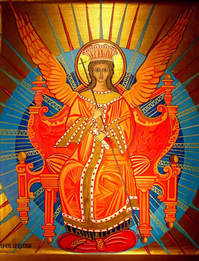 its descent, of the abasement of this Wisdom, which has made for itself a tent among men. Thus we can already feel resonate the words from the Gospel of John that speak of the tent of the flesh of the Lord. A tent was created in the Old Testament: Here is indicated the temple, worship according to the "Torah"; but from the point of view of the New Testament, we can understand that this was only a pre-figuration of the much more real and significant tent: the tent of the flesh of Christ.
its descent, of the abasement of this Wisdom, which has made for itself a tent among men. Thus we can already feel resonate the words from the Gospel of John that speak of the tent of the flesh of the Lord. A tent was created in the Old Testament: Here is indicated the temple, worship according to the "Torah"; but from the point of view of the New Testament, we can understand that this was only a pre-figuration of the much more real and significant tent: the tent of the flesh of Christ.
And we already see in the books of the Old Testament that this abasement of Wisdom, its descent into flesh, also implies the possibility of being rejected. St. Paul, developing his Christology, refers precisely to this wisdom perspective: He recognizes in Jesus the eternal Wisdom existing from all time, the Wisdom that descends and creates a tent among us, and thus he can describe Christ as "the power of God and the wisdom of God." He can say that Christ has become for us "wisdom from God, as well as righteousness, sanctification, and redemption" (1 Corinthians 1:24, 30). In the same way, Paul clarifies that Christ, like Wisdom, can be rejected above all by the rulers of this age (cf. 1 Corinthians 2:6-9), such that in the plans of God a paradoxical situation is created: the cross, which will become the path of salvation for the whole human race.
A later development to this wisdom cycle, which sees Wisdom abase itself so as to be later exalted despite rejection, is found in the famous hymn in the Letter to the Philippians (cf. 2:6-11). This involves one of the most elevated texts of the New Testament. Exegetes mainly concur in considering that this pericope was composed prior to the text of the Letter to the Philippians. This is an important piece of information, because it means that Judeo-Christianity, before St. Paul, believed in the divinity of Jesus. In other words, faith in the divinity of Christ is not a Hellenistic invention, arising after the earthly life of Christ, an invention that, forgetting his humanity, had divinized him. We see in reality that the early Judeo-Christianity believed in the divinity of Jesus. Moreover, we can say that the apostles themselves, in the great moments of the life of the Master, had understood that he was the Son of God, as St. Peter says at Caesarea Philippi: "You are the Messiah, the Son of the living God" (Matthew 16:16).
But let us return to the hymn from the Letter to the Philippians. The structure of this text can be articulated in three stanzas, which illustrate the principle moments of the journey undertaken by Christ. His pre-existence is expressed with the words: "though he was in the form of God, [he] did not regard equality with God something to be grasped" (verse 6). Afterward follows the voluntary abasement of the Son in the second stanza: "he emptied himself, taking the form of a slave" (verse 7) "he humbled himself, becoming obedient to death, even death on a cross" (verse 8). The third stanza of the hymn announces the response of the Father to the humiliation of the Son: "Because of this, God greatly exalted him and bestowed on him the name that is above every name" (verse 9).
What is impressive is the contrast between the radical abasement and the resulting glorification in the glory of God. It is evident that this second stanza contrasts with the pretension of Adam, who wanted to make himself God, and it contrasts as well with the actions of the builders of the Tower of Babel, who wanted to construct for themselves a bridge to heaven and make themselves divine. But this initiative of pride ended with self-destruction: In this way, one doesn't arrive to heaven, to true happiness, to God. The gesture of the Son of God is exactly the contrary: not pride, but humility, which is the fulfillment of love, and love is divine. The initiative of abasement, of the radical humility of Christ, which contrasts with human pride, is really the expression of divine love; from it follows this elevation to heaven to which God attracts us with his love.
Besides the Letter to the Philippians, there are other places in Pauline literature where the themes of the pre-existence and the descent of the Son of God to earth are united. A reaffirmation of the assimilation between Wisdom and Christ, with all its cosmic and anthropological consequences, is found in the First Letter to Timothy: "[He] was manifested in the flesh, vindicated in the spirit, seen by angels, proclaimed to the Gentiles, believed in throughout the world, taken up in glory" (3:16). It is above all based on these premises that the function of Christ as mediator could be better defined, within the framework of the only God of the Old Testament (cf. 1 Timothy 2:5 in relation to Isaiah 43:10-11; 44:6). Christ is the true bridge who leads us to heaven, to communion with God.
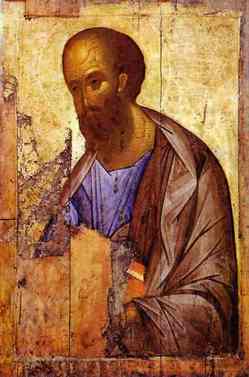 And finally, just a point regarding the last developments of the Christology of St. Paul in the Letters to the Colossians and the Ephesians. In the first, Christ is designated as the "firstborn of all creation" (1:15-20). This word "firstborn" implies that the first among many children, the first among many brothers and sisters, has lowered to draw us and make us brothers and sisters. In the Letter to the Ephesians, we find the beautiful exposition of the divine plan of salvation, when Paul says that in Christ, God wanted to recapitulate all things (cf. Ephesians 1:23). Christ is the recapitulation of everything, he takes up everything and guides us to God. And thus is implied a movement of descent and ascent, inviting us to participate in his humility, that is, in his love for neighbor, so as to thus be participants in his glorification, making ourselves with him into sons in the Son. Let us pray that the Lord helps us to conform ourselves to is humility, to his love, to thus be participants in his divinization. (Zenit.org)
And finally, just a point regarding the last developments of the Christology of St. Paul in the Letters to the Colossians and the Ephesians. In the first, Christ is designated as the "firstborn of all creation" (1:15-20). This word "firstborn" implies that the first among many children, the first among many brothers and sisters, has lowered to draw us and make us brothers and sisters. In the Letter to the Ephesians, we find the beautiful exposition of the divine plan of salvation, when Paul says that in Christ, God wanted to recapitulate all things (cf. Ephesians 1:23). Christ is the recapitulation of everything, he takes up everything and guides us to God. And thus is implied a movement of descent and ascent, inviting us to participate in his humility, that is, in his love for neighbor, so as to thus be participants in his glorification, making ourselves with him into sons in the Son. Let us pray that the Lord helps us to conform ourselves to is humility, to his love, to thus be participants in his divinization. (Zenit.org)
